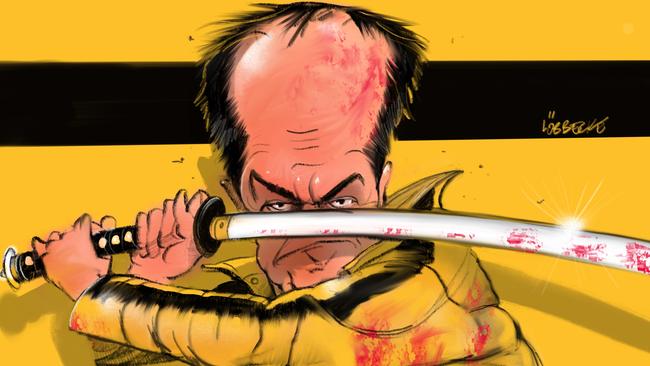
For some Labor MPs familiar with the chatter earlier this year, it was known as “Kill Bill” — a series of discussions at the highest levels of the party about whether to knife Bill Shorten and replace him as leader with Anthony Albanese.
The brazen talks about dumping Shorten came initially from within pockets of his own Victorian Right faction. The NSW Right was also deeply concerned about Labor’s standing as Malcolm Turnbull soared in the polls, and was open to another leadership coup.
Richard Marles, from the Victorian Right, broached the topic of switching leaders with Joel Fitzgibbon, from the NSW Right. Marles is close to Shorten but always had a clear-eyed view about the party’s leadership. Marles and Fitzgibbon plotted the downfall of Julia Gillard.
Marles, according to multiple sources who spoke to this column, was very worried about the party’s standing and discussed a possible leadership change with colleagues from NSW. He also talked about Shorten’s leadership with David Feeney, another powerbroker in the Victorian Right.
Albanese, from the NSW Left, was intrigued by the idea that his long-time factional opponents may back him to become leader. Fitzgibbon mentioned the chatter to Albanese. But Albanese, who narrowly lost a leadership contest to Shorten in October 2013, would not wield the knife. He would have to be drafted.
While some in the NSW Right, including Richmond MP Justine Elliot, urged the faction to dump Shorten and embrace Albanese, others were not so sure it was the right decision. The NSW Right’s union power base could not imagine supporting Albanese for leader. They were, mostly, locked into Shorten.
Chris Bowen, who had occasionally clashed with Shorten in shadow cabinet over policy, needed a lot of convincing. He had been down this road before, leading the push for Kevin Rudd to return as leader in 2012-13. Bowen knew that if the NSW Right shifted, then Shorten would be finished.
Senator Sam Dastyari, a former NSW Labor secretary, canvassed the idea of dumping Shorten with several colleagues. Tony Burke, another senior NSW Right figure, was acutely aware of the panic among Labor MPs. They both thought Shorten needed to substantially lift his game.
NSW Labor secretary Jamie Clements — who was forced to resign over a scandal in mid-January — was also open to the idea of switching the faction behind Albanese. His view was that if Labor’s poll numbers continued to tumble, then a leadership change might stem the bleeding.
The summer of 2015-16 had been brutal for Shorten. In September, Turnbull ousted Tony Abbott from the prime ministership. The Coalition skyrocketed in the polls and Labor crashed. The fear within Labor was that Turnbull could win over Labor supporters and rewrite the political map.
Labor’s huge 53-47 per cent two-party vote lead in Newspoll was reversed by November last year. Its primary vote sank to 33 per cent. Shorten went from being preferred prime minister to Abbott, 41-37 per cent in September, to lagging Turnbull by a whopping 60-14 per cent in December.
Labor’s internal polling and focus group research conducted by UMR — revealed by this writer in February — showed how diabolical Shorten’s standing was. Labor could lose a dozen seats. Voters were repulsed by the idea of Shorten as prime minister. Some of this research was withheld from Shorten.
Voters in focus groups described Shorten as an “underachiever”, “average”, “bland”, “not a strong leader” and “inadequate”. When one voter was asked to describe Shorten, they said: “Blah.” He was assessed as untrustworthy, inauthentic and without strong convictions. He paled in comparison to Turnbull.
A former Labor leader told me last week that if the caucus rules to safeguard leaders from challenge were not adopted in 2013 — requiring a petition signed by 60 per cent of MPs to force a spill when in opposition — then Shorten would have been dumped.
But Shorten got lucky. Turnbull’s promise was never realised. The word “disappointment” came to personify his prime ministership. He would not peel off swaths of Labor voters. Conservatives rebelled. Turnbull nosedived in the polls. Turnbull gifted Shorten a stay of execution.
Meanwhile, Shorten went on the policy offensive. He was eventually persuaded by Bowen and Burke to abolish negative gearing on existing properties. But it took extensive polling and focus group research to convince him to back the radical policy.
Shorten decided Labor would go to the election with a big spending, big taxing, traditional Labor agenda. Health and education would be the focus, coupled with a defence of penalty rates to mollify unions. Labor would also advocate an ambitious climate change policy.
By February, the NSW Right — which had been pushing Shorten to be bolder on policy — went cold on a leadership change. Marles, after a lot of soul-searching, came to the view that Labor should keep its nerve and stick with Shorten. He was vindicated on Saturday.
Labor rewrote the political rule book. Shorten out-campaigned Turnbull. There was deep concern in the party over the national campaign strategy. But Labor’s state branch marginal seat campaigning, especially in NSW, was brilliant. The ACTU’s campaign was equally groundbreaking. But Labor insiders were not expecting such a good result.
However, Labor should be concerned that its primary vote remains low at 35.3 per cent. A different strategy will be needed to win a majority of seats.
The party cannot be complacent; it must understand its success was in part because of Turnbull’s diminished authority and tattered credibility, and the poor Liberal campaign.
Labor may not be able to form a government but it would be madness to contemplate a leadership change now.
It is a pity Albanese did not endorse Shorten’s leadership immediately following the election and recognise that his chance to lead the party has come and gone.



To join the conversation, please log in. Don't have an account? Register
Join the conversation, you are commenting as Logout